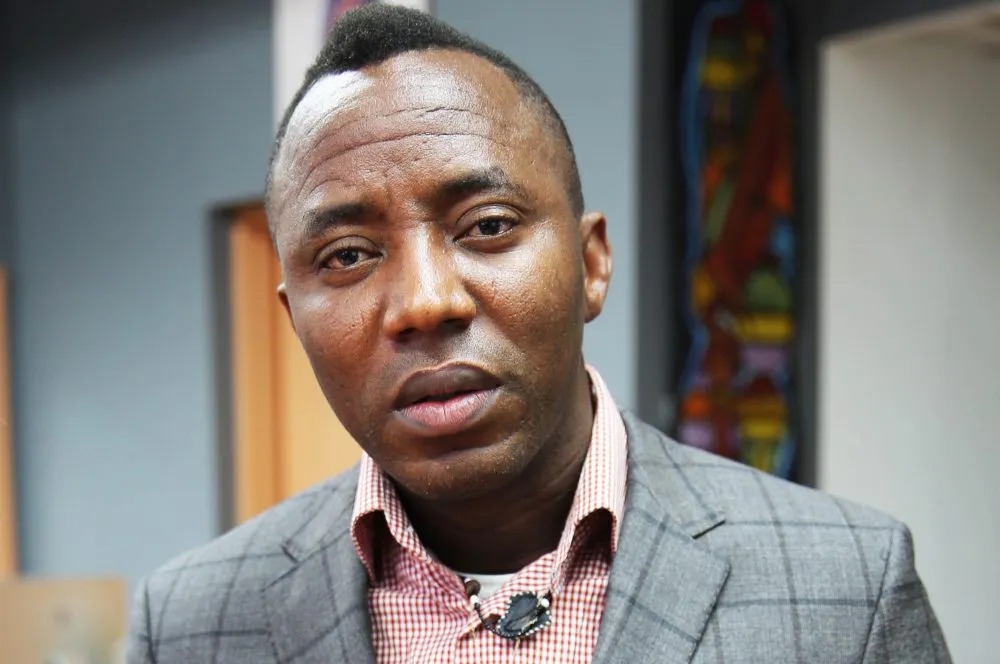
“Hijacked by Morons”: Sowore Slams Nigerian Democracy, Points Finger at Security Agencies as Real Election Riggers

On a day that marks Nigeria’s supposed celebration of democracy, fiery human rights activist and former presidential candidate Omoyele Sowore has delivered a scathing indictment of the state of the nation’s politics, describing the Nigerian democratic experiment as a system hijacked by “morons and charlatans.” Speaking at the launch of Abdul Oroh’s memoir “Demonstration of Craze: Struggles and Transition to Democracy in Nigeria” in Abuja, Sowore’s blunt assessment rang out as a clarion call for political reckoning.
According to Sowore, the crisis afflicting Nigeria’s democracy is not merely a failure of the electoral commission or political leadership — but a full-blown hijack by those who neither fought for nor understand democratic values. “We are being governed by people who did not fight for democracy,” Sowore declared. “They don’t understand it, and they don't care to uphold its tenets.”
Sowore’s most alarming revelation was his accusation that the true architects of electoral manipulation are not the officials at the Independent National Electoral Commission (INEC), but Nigeria’s own security agencies. In a chilling recount of the 2019 Kogi governorship election, he described how virtually the entire Department of State Services (DSS) in his office abandoned their posts to help rig the election in favor of then-incumbent Yahaya Bello. “They emptied the office,” he said. “Only myself, the man guarding me, and a gatekeeper were left. The rest were in Kogi to help rig the election.”
The activist’s words cut through any illusions of neutrality among those charged with securing the integrity of Nigeria’s democratic process. He insisted that while Nigerians often criticize INEC as the root of the country’s electoral woes, the real puppeteers behind the curtain are the same security forces constitutionally sworn to protect the democratic process. “Most of the people you see in INEC are likely APC card-carrying members,” Sowore alleged, but stressed that “the real riggers of elections in Nigeria are the security agencies.”
Sowore’s comments came with heavy introspection and accountability as he admitted that the democratic failures of Nigeria are also a reflection of missed opportunities and strategic miscalculations after the end of military rule in 1999. “We made a critical mistake,” he said. “We allowed charlatans to hijack the democratic process.” He painted a painful contrast with South Africa’s post-apartheid transition, where many of the country’s former activists went on to become its leaders and, ultimately, its most influential figures. “In South Africa, the most important activists became political leaders. The wealthiest today are those who fought for freedom,” Sowore observed. “But in Nigeria, those who fought for democracy remain the poorest.”
The event wasn’t just a book launch — it was a gathering of kindred spirits who had once been on the frontlines of Nigeria’s democratic struggle. Yet even here, Sowore underscored a disturbing reality: the dwindling influence and shrinking platforms of those who once risked their lives for the freedom of all. “A few weeks ago, another hall was filled to the brim with people who destroyed democracy in Nigeria. But when people who fought for it held an event, it barely filled a room,” he said, contrasting the attention given to former dictator Ibrahim Babangida’s book launch with the subdued reception of Oroh’s memoir.
For Sowore, it was not just a moment of reflection but of frustration — the type that comes when the values one fights for become endangered by the very system that should protect them. “We can write books from now till eternity,” he stated, “but nothing will change until the people with integrity are the ones in charge.” He painted a grim picture of a society where integrity has been pushed to the margins, while impunity, corruption, and political mediocrity reign. “As long as we keep clapping at book launches and refusing to confront the looters, we are only entertaining ourselves while they continue to mock us,” he warned.
His remarks struck a raw nerve among those familiar with Nigeria’s political terrain. Sowore has long been a thorn in the side of successive governments, and his activism has come at a steep personal price. Arrested, detained, and currently without his passport under the administration of Comrade Adams Oshiomhole, Sowore says his persecution is symbolic of the broader crackdown on dissent and democratic accountability. “Many of you have not been arrested or had your passports seized. I have,” he said. “Why? Because we failed to build a democracy that guarantees our rights.”
He delivered perhaps his most biting summary of Nigeria’s condition with a term he coined years ago: “Morontocracy — a democracy hijacked by morons.” It's a phrase he returned to with even greater conviction on this day, calling it a painfully accurate description of what has become of the country’s political order. “We’re not living in a democracy,” he said. “We’re living under a morontocracy — and until we fix that, we will keep going in circles.”
With each word, Sowore challenged not just the political elite, but the citizenry as well. He asked a haunting question: “Can anyone name a truly influential Nigerian today who fought for democracy?” The silence that followed might have echoed his point louder than any answer could.
His speech ended not with hope, but with a plea: to stop being comfortable with a failed system, to stop normalizing impunity, and to begin the hard, uphill work of reclaiming Nigeria’s democracy from those who have turned it into a tragic theater of personal gain.
Sowore's words are not just a condemnation; they are a mirror held up to a nation too often distracted by spectacle, lulled by ceremony, and paralyzed by apathy. As Nigeria marks another year under the banner of democracy, the question now is whether that banner still has meaning — or whether, as Sowore warns, it has become little more than a camouflage for tyranny in civilian clothing.


